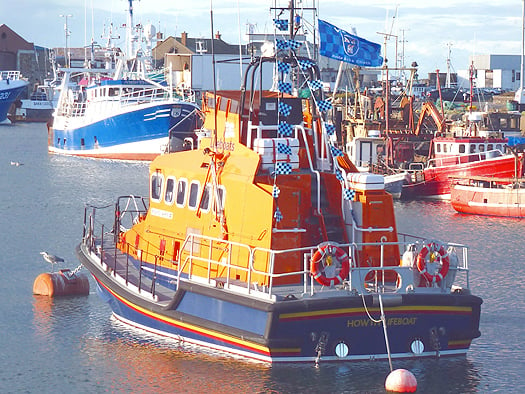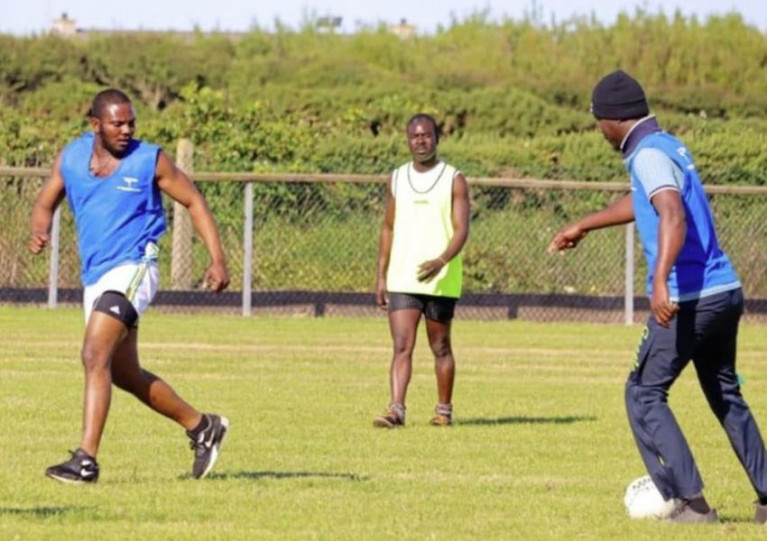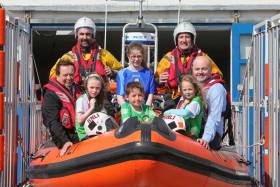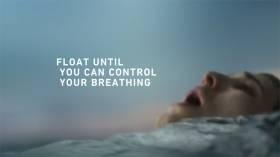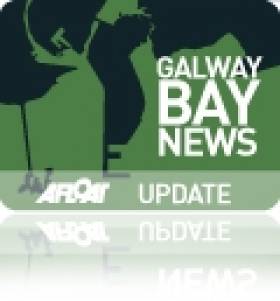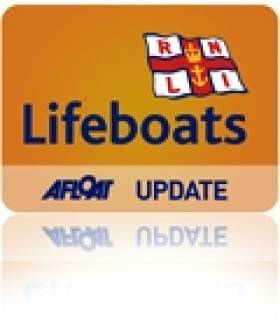Displaying items by tag: GAA
RNLI volunteers across the island of Ireland took to the pitch during Sunday’s (9 July) All-Ireland senior hurling championship semi-final at Croke Park, to promote the charity’s water safety partnership with the GAA.
Before the throw-in at the Clare vs Kilkenny decider and in front of thousands gathered at the stadium, RNLI volunteers— dressed in their full lifeboat kit—unfurled a giant flag showing an all-weather lifeboat in action.
A second group of RNLI crew wearing county jerseys unfurled a flag with a water safety message, calling on everyone to Float to Live.
Then at half-time, the crew took to the pitch once again as interviews were done by Ballygunner and Waterford GAA’s Dessie Hutchinson, alongside Lisa Hollingum, RNLI area lifesaving manager.
Six years on, the RNLI and GAA water safety partnership serves to raise awareness of drowning prevention and to educate communities on how to stay safe in and around the water.
The partnership is part of the GAA Healthy Clubs programme and has seen RNLI lifeboat crew visiting GAA clubs around Ireland to deliver water safety talks to all age groups.
 RNLI volunteers came together at Croke Park on Sunday 9 July to promote their crucial water safety campaign | Credit: Sportsfile
RNLI volunteers came together at Croke Park on Sunday 9 July to promote their crucial water safety campaign | Credit: Sportsfile
Speaking about Sunday’s event in Croke Park, Lisa Hollingum said: “Our partnership highlights the shared values between ourselves in the RNLI and the GAA, notably volunteerism and the importance of communities. It was a privilege for our RNLI crew to be invited to Croke Park on such a big day in the GAA’s championship calendar and to have the opportunity to promote a key drowning prevention message, float to live.
“If you find yourself struggling in the water unexpectedly, your instinct will tell you to swim hard. But cold water shock could make you gasp uncontrollably. Then you could breathe in water and drown.
“Instead, we want you to float to live. Tilt your head back with ears submerged, Relax and try to breathe normally. Move your hands to help you stay afloat. It’s OK if your legs sink. Spread your arms and legs to improve stability.”
Commenting on the partnership, Dessie Hutchinson—a native of Dunmore East where the RNLI has a Shannon class lifeboat—said: “Growing up along the coast in Dunmore East, the sea surrounded me, and I have watched over the years as fishermen and visitors use it for both business and leisure.
“It has always been so reassuring for everyone in the community to have a lifeboat station powered by a dedicated team of volunteers who we know in any given moment will drop what they are doing to respond to their pager and go to the aid of someone in need.
“That’s why I am so delighted to see the GAA and RNLI come together in a water safety partnership as our shared values of volunteerism and pride in where we belong can make a real lifesaving difference.”
A GAA club in Northern Ireland has had an influx of new players from much further overseas then it’s used to.
BBC News reports on the fishermen from Ghana who have taken up Gaelic football as a pastime in between their gruelling shifts fishing out of Ardglass.
Edward Kweku Dzidzornu is one of a community of 30 seafarers from Ghana who settled in the Co Down coastal town a year ago.
And he explains how when he first attended a training session at the GAA club, he “wondered how could I play football with my hand and my leg also”.
BBC News has more on the story HERE.
GAA Personalities Back RNLI’s ‘Respect The Water’ Campaign
GAA presenter and commentator Marty Morrissey and hurling legend Anthony Daly joined the lifeboat crew from Kilrush RNLI and young players from Co Clare to raise awareness of the risks of drowning and encourage people to enjoy the water safely.
Ireland’s ‘Respect the Water’ campaign is part of a joint-partnership between the RNLI and the GAA, and involves RNLI volunteer ambassadors visiting GAA clubs around the country to give water safety advice to young people and to raise awareness of the risks of drowning.
Thirty-seven RNLI volunteers have delivered over 100 talks as part of the partnership, with more due to take place during the summer months.
To promote this year’s campaign, Marty Morrissey and Anthony Daly joined young players from Killimer GAA, Kilrush Shamrocks, Kilrush Ladies Football Club, Kilkee Football Club, Kilkee Bealaha GAA, West Clare Gaels and O’Currys GAA.
Both men had very personal reasons for backing the partnership and becoming ambassadors for it.
I am from a fishing village so well aware of the dangers of the sea
Marty Morrissey’s home place is in the picturesque fishing village of Quilty in West Clare on the Wild Atlantic Way, where the sea has always been part of everybody’s life.
As a result, Marty loves the water but is also aware of its dangers and although he attempted to learn how to swim as a child, he never quite got over his fear.
This was re-enforced in recent months when he was filming a survival sequence in the recent TV hit Marty and Bernard’s Big Adventure when they had to enter a lake and that old fear returned. He has promised himself to learn how to swim when this season’s GAA Championship is over.
Speaking at the launch, he said: “When I was young boy growing up in Quilty, my bedroom literally looked out onto the Atlantic Ocean. I remember that every 13 seconds the light from the lighthouse on the Aran Islands shone in my window.
“I would paddle in the water and some of my friends would jump into the water back at the pier in Seafield, but I wouldn’t, I had the fear. I want to get over that and I’ve set myself the challenge to learn properly.
“It is so important because after all, we all live on the island of Ireland and water plays such an important part of our lives. I am from a fishing village so well aware of the dangers of the sea.”
Speaking on the importance of the partnership, he continued: “I think the RNLI and the GAA are interlinked in many ways. They are both about community. I love the water and I respect it. If we can get more people enjoying it safely and raising awareness so that no family have to go through the pain of losing a loved one, then I see that as a win.
“We’ve had too many tragedies in this country. I’m looking forward to the day that I can go for swim and enjoy the water.”
I think there is an awareness of water safety, but we can never stop banging the drum
Anthony Daly has a very personal reason for wanting to promote the partnership. He lost a good friend, Michael ‘Fondi’ Scanlan, to drowning many years ago.
Fondi was a long-standing kit man at his beloved Clarecastle GAA club and drowned while out fishing. Speaking about the tragedy, Anthony said: “Everyone knew and loved Fondi. He was from a big family where I grew up. He was a great GAA man and came from a strong fishing background.
“When word came to the village that Fondi was lost, there was a rush to the quay to help. We spent the week walking the banks and we wouldn’t go to training while the search was ongoing.
“He was found the following Sunday at the River Fergus and while it was a blessing for the family, his loss has been deeply felt by everyone who knew him.”
Anthony swims in the sea every week and has made sure his daughters can swim. Commenting on the campaign, he said: “The RNLI is a great organisation for the GAA to be involved with in local communities. I think there is an awareness of water safety, but we can never stop banging the drum.
“I love the water and I want my daughters to love the water, too, and not fear it. Anything we can do to raise awareness of the risks of drowning and to share water safety advice, can only be a good thing.”
The key message of the RNLI’s ‘Respect the Water’ campaign is to Float To Live if you find yourself in trouble in cold water:
- Fight your instinct to swim hard or thrash about – this can lead to breathing in water and drowning
- Instead, relax and float on your back, until you have regained control of your breathing
- The recommended floating position is to lean back in the water and keep your nose and mouth clear and extend your arms and legs
- If you find it difficult to float then make gentle motions such as sculling with your hands and feet and concentrate on bringing your breathing under control
The RNLI will be present at Croke Park on Sunday 28 July to promote the Respect the Water campaign during the All-Ireland hurling semi-final and to share water safety advice with the thousands of fans travelling to see the match.
Volunteers from RNLI lifeboat stations around Ireland will be on the pitch at half time to share the Float To Live message. The campaign is running throughout the summer with advertising across cinema, outdoor posters, radio, online, and catch-up TV channels.
For more advice on how to float and other water safety advice visit RespectTheWater.com
RNLI Brings Drowning Prevention Message To Croke Park For Today’s All Ireland Semi-Final
#WaterSafety - RNLI volunteers from lifeboat stations across Ireland will be taking to the pitch in Croke Park this afternoon (Sunday 12 August) for the All-Ireland Senior Championship Football Semi-Final to share the ‘Float to Live’ message.
The charity is working with the GAA to share drowning prevention advice with their clubs around the country with the aim of saving lives.
The RNLI’s drowning prevention campaign ‘Respect the Water’ is being supported by the GAA’s Healthy Clubs programme. On the pitch later today, RNLI volunteers will unfurl two giant flags for ‘Respect the Water’ and ‘Float to Live’ to highlight the campaign and give people a single survival skill in the water: floating.
The display will be accompanied by the 30-second ‘Float to Live’ video and a halftime interview with the RNLI, featuring comedian, broadcaster — and Dun Laoghaire RNLI lifeboat volunteer — PJ Gallagher.
Volunteer ambassadors have been recruited and trained from RNLI lifeboat stations to deliver short talks and demonstrations to GAA clubs in their local communities so that young men and women can understand the risks of drowning and how a simple action could save a life. The ambassadors are RNLI volunteers who are also passionate about GAA and include, players, coaches, referees and supporters.
‘Float to Live’ is the key safety message of the ‘Respect the Water’ campaign. Even the strongest swimmers can be caught out by the power of the water. The survival message is to fight your instinct to panic, and instead stay calm and float until you can control your breathing. Then a decision can be taken on the next step, to shout for help or try and swim to safety.
The senior football semi-final features two land-locked counties but the RNLI says it is delighted to have the opportunity to share its safety messages with an audience that may not be traditionally associated with lifeboats. The charity adds that the advice applies to everyone whether on the coast or enjoying inland waters and loughs.
“We are extremely grateful to the GAA for giving us the opportunity to highlight the work our two organisations are doing together to try and raise awareness of the risks of drowning and what action to take that could save a life,” said RNLI head of community engagement Gareth Morrison.
“We are looking forward to visiting many more clubs in the weeks and months ahead to share the message.”
PJ Gallagher added: “I know it might come as a surprise to some but I am an RNLI volunteer lifeboat crew member. It will also be less of a surprise to many that I am a passionate and dedicated GAA supporter.
“Being on the pitch during an All-Ireland semi-final is a bit of a dream come true and I’m delighted that it is for such an incredible partnership. I just hope the message will help save lives and I’d encourage everyone to talk about it and share it.”
To find out more about the campaign, visit RespectTheWater.com.
#GalwayBay - The freezing Atlantic waters of the Galway Bay coast might seem like a strange place to find a women's Gaelic football team in full-on training mode.
But for the Galway senior ladies squad, a quick dip in the chilly sea at Silver Strand was just the ticket to push them "to the next level" in their quest for the Division One league title in tonight's final replay (Saturday 16 May).
As strength and conditioning coach Ann Caffrey told the Connacht Tribune, the unorthodox seaside training session following their draw against All-Ireland champions Cork was the right option for her women "because a tough match deserves a tougher recovery".
Howth Lifeboat Shows True Colours
Howth Lifeboat at 1800 hrs the night before the big match - inspite of our photograph we are assured that any Kerry sailors in difficulty on the Irish Sea this weekend will be treated the same as everyone else.
Meanwhile the last manager to lead Dublin into All-Ireland SFC battle has given his blessing to Pat Gilroy's troops as they seek to snare pre-match favourites Kerry and bring Sam back to the capital for the first time in 16 years.Dr Pat O'Neill has savoured the buzz around the city this week and feels "very confident" that the current team can emulate the All-Ireland achievement of his 1995 heroes. Up the Dubs!
